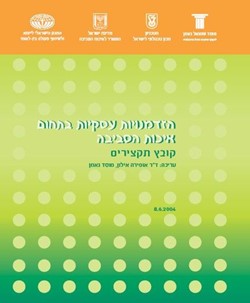
Cite As:
Ayalon Ofira.
Proceedings of conference- Business opportunities in Environmental Technologies Haifa Israel: Samuel Neaman Institute, 2004. https://www.neaman.org.il/EN/Proceedings-of-conference-Business-opportunities-in-Environmental-Technologies
Alongside the multitude of new products and technologies displayed during the 3rd International Exhibition and Conference for Environmental Technologies, one of the highlights was a seminar on Environmental Business Opportunities, hosted by the Samuel Neaman Institute of the Technion - Israel Institute of Technology in cooperation with the Ministry of the Environment and the Israel Export Institute.
The seminar, which drew participants from the financial and banking sectors as well as entrepreneurs and industrialists, dealt with commercial opportunities for Israel's environmental technologies. Its aim was to increase awareness of the potential of the environmental technologies market, to provide case studies of environmental technologies in Israel, to survey the availability of government support and to identify ways of advancing Israel's environmental companies so as to enable them to take a more substantial part in this promising global market.
In her opening remarks to the participants, the director general of the Ministry of the Environment, Dr. Miriam Haran, reiterated the Environment Ministry's conviction that the recipe for economic development rests in the development of a profitable industry and infrastructure in which environmental and creative solutions are integrated. Studies undertaken by major corporations worldwide have shown that environmental considerations and increases in environmental indicators are correlated with a rise in profits. The Environment Ministry has long contended that development which is integrated with environmental solutions and local environmental expertise may well prove to be an economic impetus for the development and implementation of local technologies. According to Dr. Haran, "national policy which supports the development of environmental technologies will be profitable for all sides: it will catalyze the development of an industry with significant export potential and will ensure a cleaner environment in Israel for the benefit of the entire population."
The Seminar: A Short Synopsis
To a large extent, the seminar was based on the preliminary findings of a study conducted by the Samuel Neaman Institute on business opportunities on the development of environmental technologies in Israel. Based on the initial results, it is already clear that the potential of this sector is great.
Following is a short survey of the proceedings:
1. Business Opportunities of Israeli Environmental Technologies: The first session of the seminar surveyed the development of environmental technologies in Israel, including an overview of the practical research undertaken in the country's institutes of higher learning. Several environmental industries were highlighted, including some that began within the framework of an innovative program, known as the technological incubator, which provides support for the incipient stage of research and development initiated by the individual inventor or entrepreneur. The program, initiated by the Office of the Chief Scientist in the Ministry of Industry and Trade in the early 1990s, has already enabled several innovative ideas to develop and commercialize.
Yet another presentation dealt with emerging business opportunities in Europe as a result of the recent expansion of the European Union. The 10 Eastern European states that have joined the EU will be subject to compliance with strict environmental regulations and standards, a reality that will require massive investments in environmental projects and infrastructures. Israeli companies have the capacity to implement many of these projects, especially in the area of sewage, water supply and solid waste treatment.
Additional opportunities exist in the realm of greenhouse gas trading as a result of Israel's recent ratification of the Kyoto Protocol. As a developing country under the Climate Change Convention, Israel can now implement the Clean Development Mechanism. This mechanism provides an economic opportunity for Israeli companies to advance projects which support the principles of sustainable development.
2. Establishment of a Solar Power Plant in the Negev as a Case Study: In May 2003, the Israel government decided to prepare a strategic plan for sustainable development. Within the framework of this decision, the Ministry of National Infrastructures is taking a number of steps to improve the efficiency and utilization of different energy sources and to promote energy conservation and alternative energy sources. Furthermore, as per a November 2002, at least 2% of the country's electricity consumption must be produced by renewable energy by the year 2007. Therefore, plans are being advanced to establish a 500 MW solar energy plant in the Negev with the first unit (100 MW) scheduled for 2007. Development of the solar power industry will reduce Israel's dependence on imported fuels, lower air pollution and the emission of greenhouse gases, provide employment and establish Israel's place as one of the world leaders in the field of solar energy.
This session also included a survey of the Environmental Technologies Department in the Israel Export Institute. According to its director, Mr. Avraham Israeli, some 500 Israeli companies deal with environmental subjects, of which some 200 companies already export or are interested in exporting their products, technologies and environmental services. The current output of Israel's environmental technologies sector is estimated at $400 million, with export totaling $300 million.
The Israel Export Institute helps to expose Israeli companies and technologies to markets abroad by such means as exhibitions, incoming and outgoing delegations, publication and distribution of an index of companies, and production of an electronic newsletter (Environline) which is distributed to some 8000 subscribers once a month. Each publication highlights two Israeli companies. Over the past two years alone, exhibitions and meetings were organized in Greece, Italy, Romania, the United States, Poland, Spain and China.
3. Financing of Environmental Projects and Fulfilling the Potential of the Environmental Technologies Market in Israel
The final session of the seminar dealt with means of integrating ideas and projects with the capital necessary to fulfill them. It related to government's role in the creation of the necessary conditions for the success of environmental technology initiatives, presented the case of several Israeli companies which have developed innovative technologies, and surveyed both obstacles and opportunities.
The advancement of the project will be published soon.
Publications that might interest you